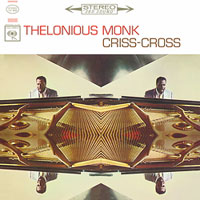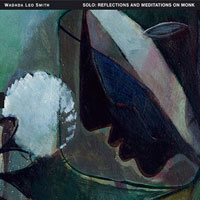Thelonious Monk • Criss-Cross
Wadada Leo Smith • Solo: Reflections And Meditations On Monk
ecord labels dug deep last year to meet the occasion of Thelonious Monk's 100th birthday, releasing newly discovered and reissued recordings along with a few albums inspired by the giant of jazz piano. The "newly discovered" prize was seized by Sam Records/Saga for its Les Liaisons Dangereuses, which was first released as a two-LP set and more recently as a single 200-gram LP cut by Kevin Gray and pressed at Quality Record Pressings. Neck and neck for quality is the three-record box set from Concord Craft Recordings, The Complete 1957 Riverside Recordings of Monk and John Coltrane [CRA-9775]. Out just in time for end-of-the-year shoppers was The Compete Prestige 10-inch LP Collection [Concord Craft Recordings CRA-9170], a set of five 10" records from 1953 and 1954. And then there is Criss-Cross, one of Monk’s many Columbia recordings made between 1962 and 1968. Columbia promoted Monk much better than Riverside had, resulting in better sales. Monk composed little during his Columbia years, and Criss-Cross, his second Columbia release, includes only material he had previously recorded with other sidemen for Riverside and Prestige. On this 1963 outing, his quartet, composed of Charlie Rouse on tenor, John Ore on bass and Frankie Dunlop on drums, had been together for four years, a more stable group than was normal for him, and resulting in an album that featured as tight an ensemble as Monk ever fronted. You won’t find any audiophile box set of Monk’s Columbia releases, as you will with his earlier Riverside LPs, but Impex, ORG Music, Speakers Corner and now Pure Pleasure are whittling away at the backlog bit by bit. The Columbia studio sessions are uniformly well recorded, benefiting from the label's fine New York facilities. Most, including this title, were originally released in both mono and stereo. Pure Pleasure’s reissue is in stereo, and both the original and this reissue show that Columbia could reproduce stereo sound to great effect in the early 1960s. This reissue, pressed by Pallas in Germany and mastered by Ray Staff at London-based Air Mastering, is a close reproduction of the original release. Monk’s music may well be the most covered jazz in existence, and all-out tribute albums are fairly common -- perhaps a dozen and a half exist. Certain historical figures like Steve Lacy and Paul Motion clearly take Monk as their major influence, and now trumpet king Wadada Leo Smith pays tribute to Monk, saying (in verse) of Monk, "I am closer to you than to any other artist / Not in the way you inform your music practice and ensemble intelligence / Maybe that too / But how we calculate inspiration." Smith released two CDs in December 2017, and the other, Najwa [TUM Records TUM CD 049], a plugged-in blast with four guitars plus electric bass, scored a Best of 2017 nod from the New York Times. It’s this solo tribute to Monk, however, that takes my breath away. The collection of trumpet solos is exceptionally well recorded by a Finnish team. Among the many high points is Smith’s rendition of "Crepuscule with Nellie," written by Monk in 1957 for his wife Nellie while she was undergoing surgery. It was originally recorded with Ray Copeland on trumpet, but Charlie Rouse takes the main line on Criss-Cross. Smith carries the whole load on Solo, and you can almost believe that Monk is in the room. TUM Records produces some of the most beautiful CD packages on the market today. This CD is encased in a tri-fold case with commissioned artwork and a tipped-in booklet containing detailed musical and recording notes. These two releases underscore Monk’s importance to
great effect. Whether it is through one of his best recordings from the 1960s or through a
tribute from one of today’s great musical treasures, Monk’s light shines as
brightly as ever. |


